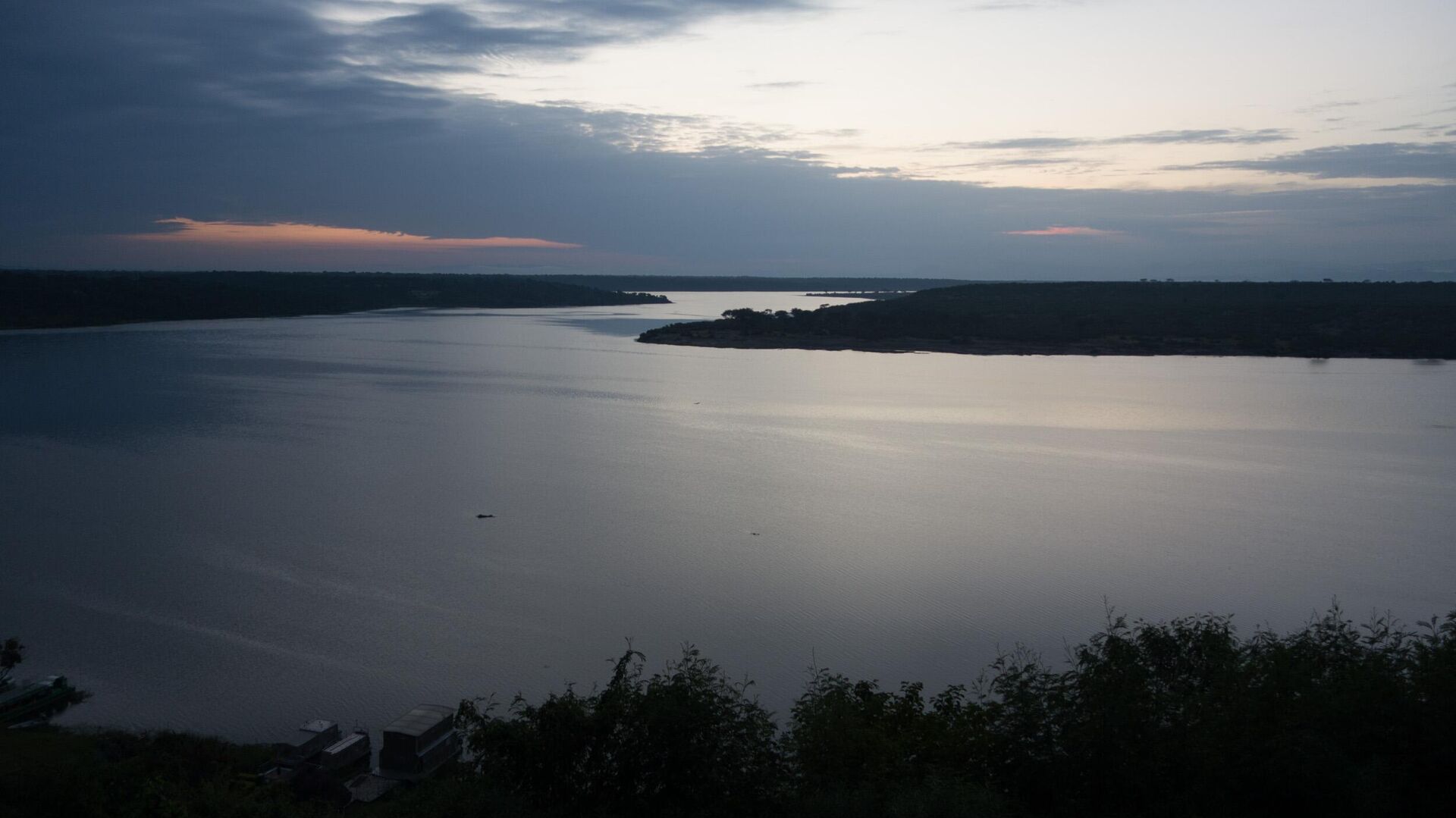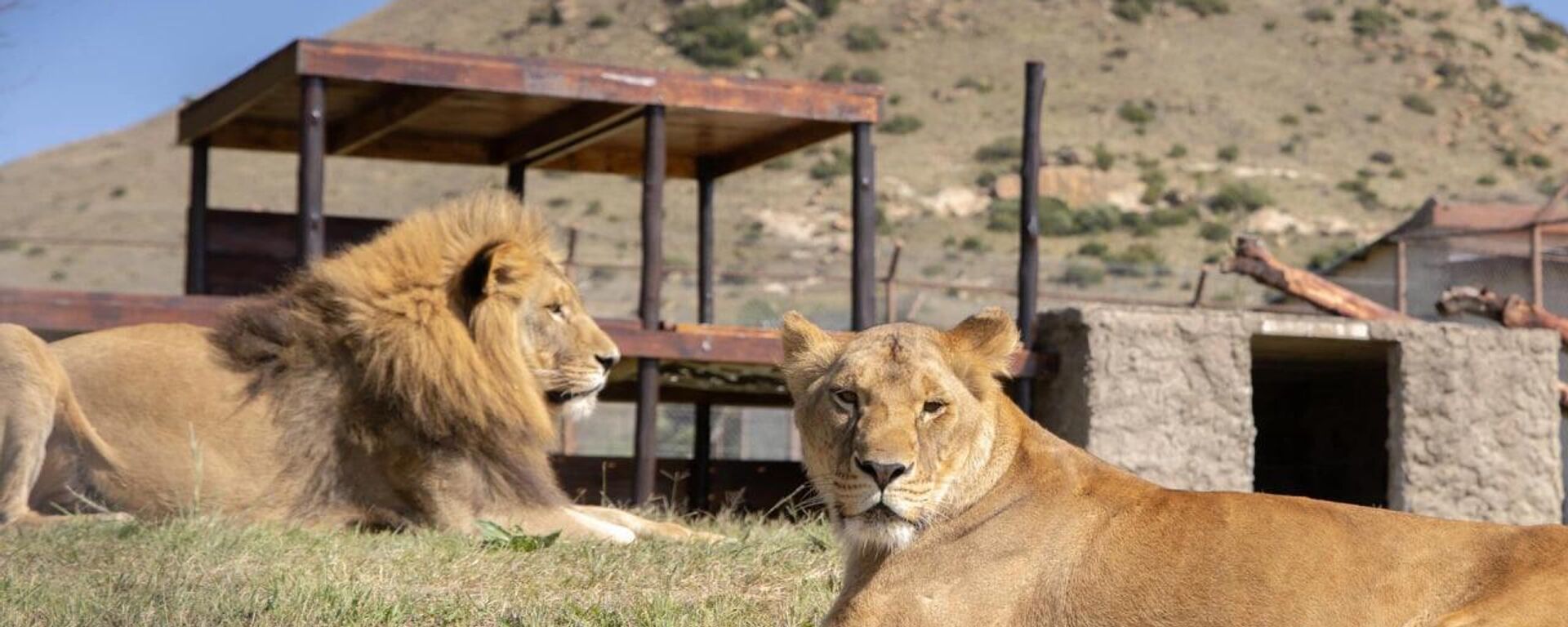https://en.sputniknews.africa/20240620/what-wont-you-do-for-love-ugandas-three-legged-lion-sets-record-for-swimming-across-channel-1067146430.html
What Won't You Do for Love? Uganda's Three-Legged Lion Sets Record for Swimming Across Channel
What Won't You Do for Love? Uganda's Three-Legged Lion Sets Record for Swimming Across Channel
Sputnik Africa
Lions are not fans of swimming; however, researcher Alexander Braczkowski and his team managed to capture a unique event using a thermal camera and a drone... 20.06.2024, Sputnik Africa
2024-06-20T15:46+0200
2024-06-20T15:46+0200
2024-06-20T17:01+0200
sub-saharan africa
uganda
east africa
lion
animals' protection
animals
nature
research
viral news
https://cdn1.img.sputniknews.africa/img/07e8/06/14/1067148618_0:131:2500:1537_1920x0_80_0_0_8fdca78ea99a6c08d41ed4aaab6d9caa.jpg
Jacob, a three-legged African lion who lost his paw to a poacher’s trap, and his brother Tibu swam 1.5 kilometers across the Kazinga Channel in Uganda’s Queen Elizabeth National Park, setting a new record — the longest swim ever recorded among lions, Australia’s Griffith University scientist and conservation biologist Alexander Braczkowski told the media.The brothers had previously tried to cross the dangerous channel (it is home to one of the world's highest concentrations of hippos and numerous Nile crocodiles) several times but returned to the shore, probably because of animals hiding in the water, the scientist reportedly noted. Only the fourth attempt was successful.But why did the lions need to go on such a dangerous journey? One important reason is as old as time: reproduction, Braczkowski explained, a view supported by his American colleague Craig Packer in an interview with Western media. Male lions have a pretty short lifespan (only 8–10 years) due to the dangers they have to encounter, so they don't have much time to leave offspring.However, this is not the only reason for their water cruise. It appears that the lions swam across the channel because they were also legging back, as earlier, in search of lionesses, they wandered into the established territory of other males but were simply driven out. In addition, there is a "strong" human presence on the only land available, according to the media.Braczkowski and his fellow researchers will reportedly publish their photo and video materials and research in the scientific journal Ecology and Evolution. Despite the fact that this story, on the one hand, seems quite natural for the animal world and even inspiring, the biologist in his study talks about the negative reasons for such a swim.It's not just about mating and searching for new free territories, but also about the fact that the world's “most imperiled and iconic wildlife are facing tough decisions under increasing human pressure,” according to the report. The biologists urged further research into the link between extended swimming and the functional habitats of big cats in regions now heavily influenced by human activity.
https://en.sputniknews.africa/20240501/two-stray-lions-found-malnourished-in-ukraine-and-montenegro-are-transported-to-south-africa-1066317424.html
uganda
east africa
Sputnik Africa
feedback@sputniknews.com
+74956456601
MIA „Rossiya Segodnya“
2024
Christina Glazkova
https://cdn1.img.sputniknews.africa/img/07e7/0b/07/1063380906_0:0:673:674_100x100_80_0_0_79628b4d0cd9f29291a57aa13bbf9e7a.jpg
Christina Glazkova
https://cdn1.img.sputniknews.africa/img/07e7/0b/07/1063380906_0:0:673:674_100x100_80_0_0_79628b4d0cd9f29291a57aa13bbf9e7a.jpg
News
en_EN
Sputnik Africa
feedback@sputniknews.com
+74956456601
MIA „Rossiya Segodnya“
Sputnik Africa
feedback@sputniknews.com
+74956456601
MIA „Rossiya Segodnya“
Christina Glazkova
https://cdn1.img.sputniknews.africa/img/07e7/0b/07/1063380906_0:0:673:674_100x100_80_0_0_79628b4d0cd9f29291a57aa13bbf9e7a.jpg
uganda, east africa, lion, animals' protection, animals, nature, research, viral news
uganda, east africa, lion, animals' protection, animals, nature, research, viral news
What Won't You Do for Love? Uganda's Three-Legged Lion Sets Record for Swimming Across Channel
15:46 20.06.2024 (Updated: 17:01 20.06.2024) Christina Glazkova
Writer / Editor
Lions are not fans of swimming; however, researcher Alexander Braczkowski and his team managed to capture a unique event using a thermal camera and a drone while keeping a distance of 50-70 meters.
Jacob, a three-legged
African lion who lost his paw to a poacher’s trap, and his brother Tibu swam 1.5 kilometers across the Kazinga Channel in Uganda’s Queen Elizabeth National Park, setting a new record — the longest swim ever recorded among lions, Australia’s Griffith University scientist and conservation biologist Alexander Braczkowski told the media.
The brothers had previously tried to cross the dangerous channel (it is home to one of the world's highest concentrations of hippos and numerous Nile
crocodiles) several times but returned to the shore, probably because of animals hiding in the water, the scientist reportedly noted. Only the fourth attempt was successful.
But why did the lions need to go on such a dangerous journey? One important reason is as old as time: reproduction, Braczkowski explained, a view supported by his American colleague Craig Packer in an interview with Western media. Male lions have a pretty
short lifespan (only 8–10 years) due to the
dangers they have to encounter, so they don't have much time to leave offspring.
However, this is not the only reason for their water cruise. It appears that the lions swam across the channel because they were also legging back, as earlier, in search of lionesses, they wandered into the established territory of other males but were simply driven out. In addition, there is a "strong" human presence on the only land available, according to the media.
Braczkowski and his fellow researchers will reportedly publish their photo and video materials and research in the scientific journal Ecology and Evolution. Despite the fact that this story, on the one hand, seems quite natural for the animal world and even inspiring, the biologist in his study talks about the
negative reasons for such a swim.
It's not just about mating and searching for new free territories, but also about the fact that the world's “most imperiled and iconic wildlife are facing tough decisions under increasing human pressure,” according to the report. The biologists urged further research into the link between extended swimming and the functional habitats of big cats in regions now heavily influenced by human activity.



